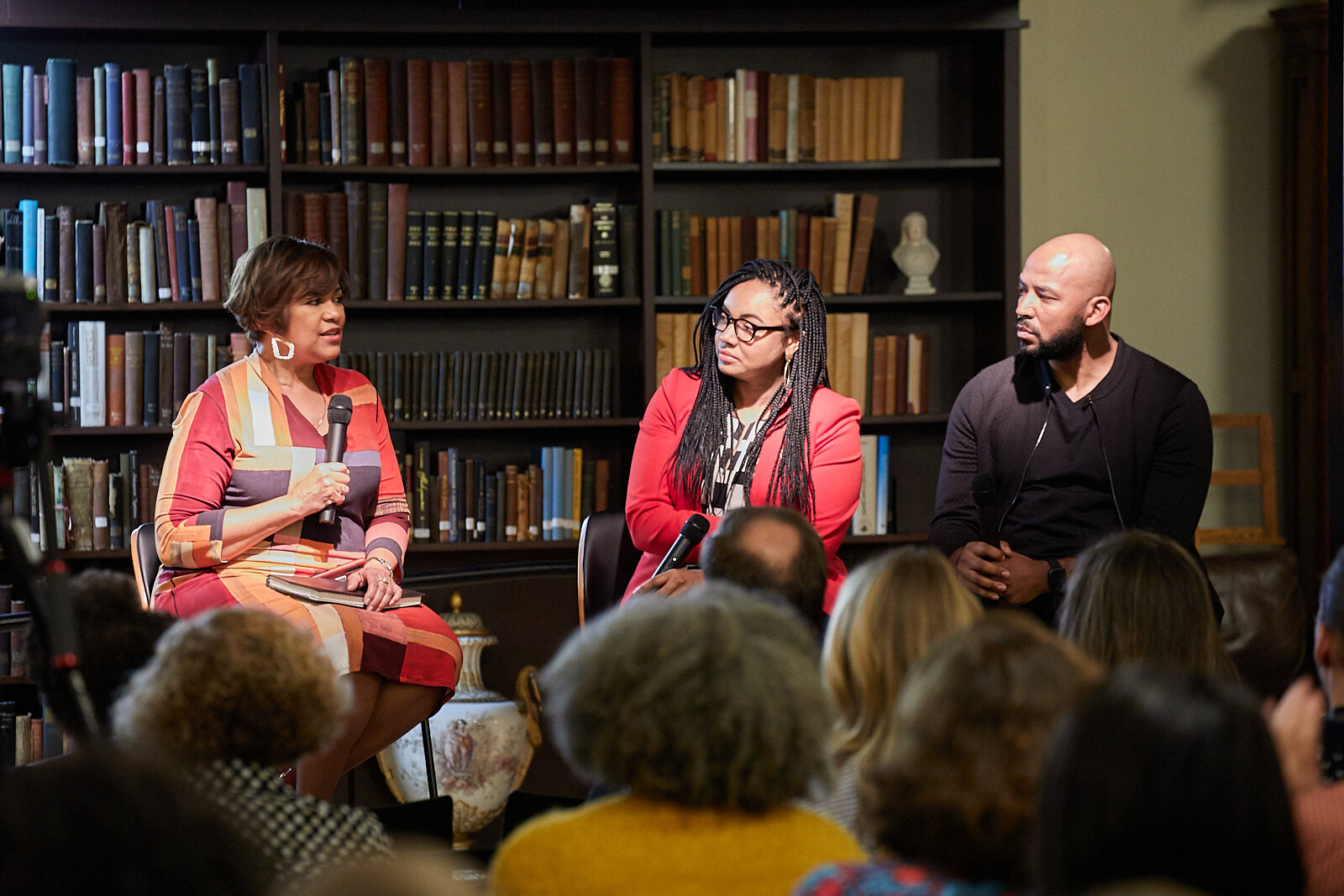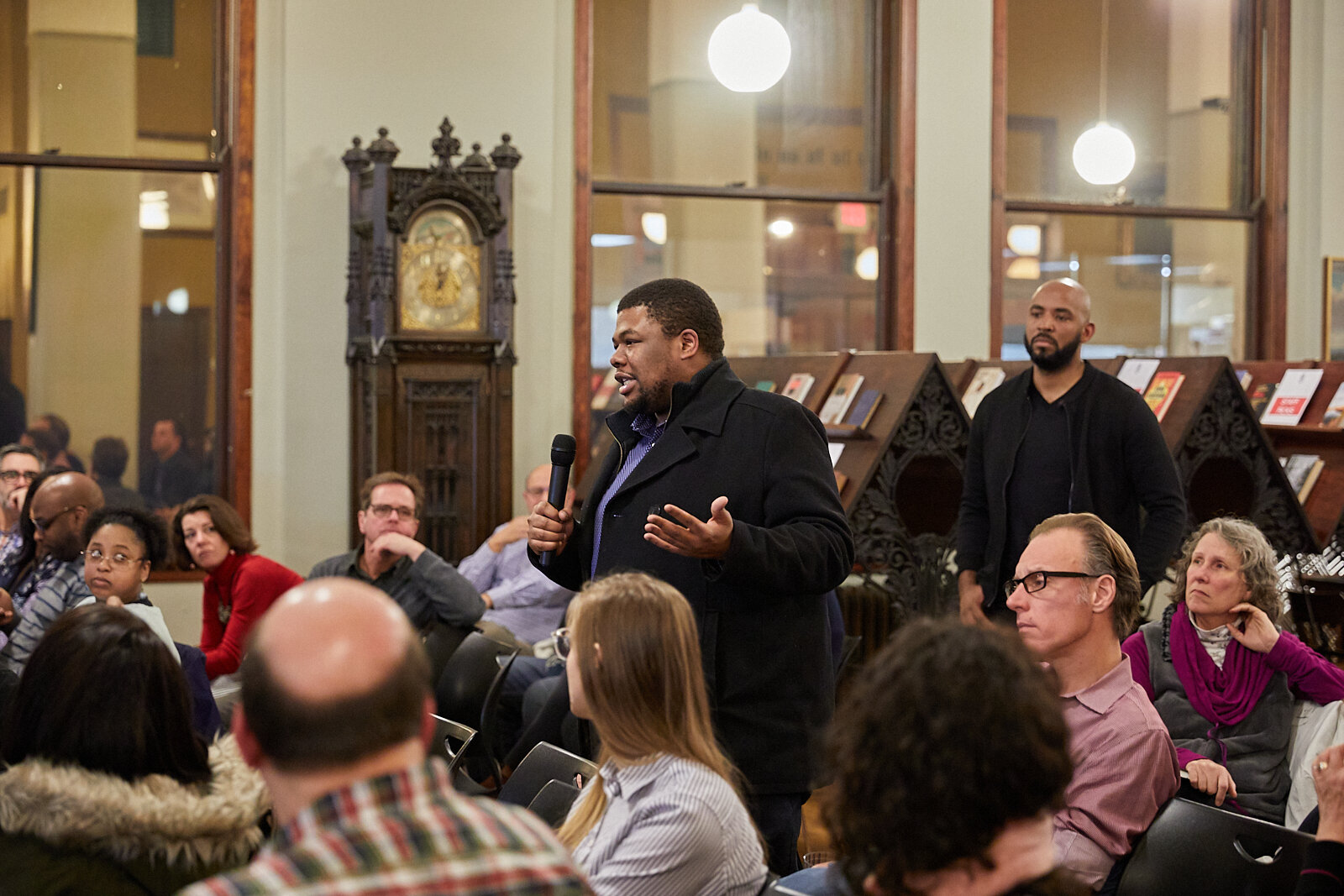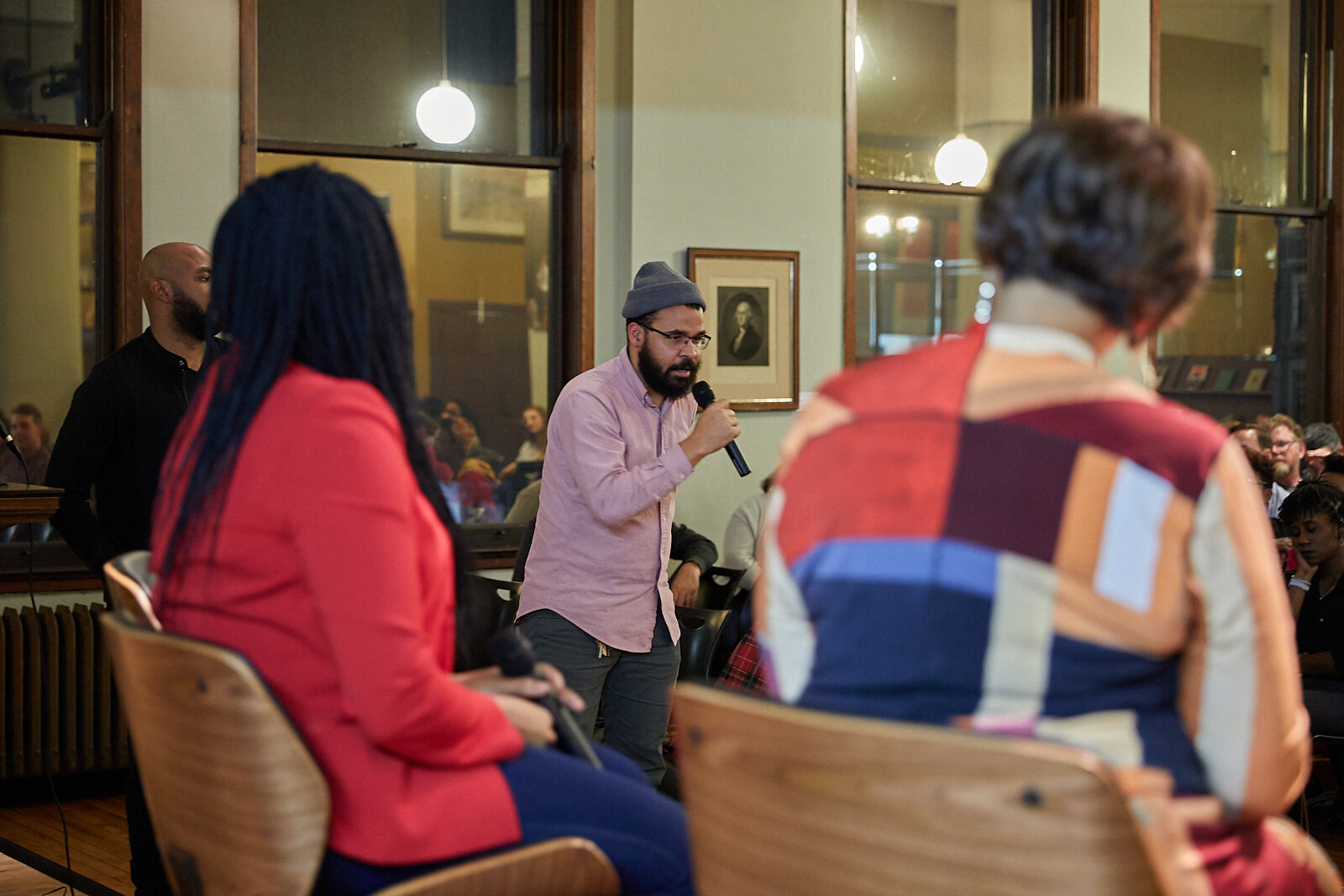BY LEYLA SHOKOOHE
PHOTOGRAPHY BY JP LEONG
New year, new Urban Consulate location! Cincinnati is the latest city to welcome the civic-minded salon series, with community connectors Garry “Gee” Horton, Naimah Bilal and Megan Trischler taking the helm to guide Queen City lovers through opportunities for reflection and transformation.
“We’re going to learn together, we’re going to heal together, and we’re going to act together,” said Bilal as she welcomed over 100 diverse guests to The Mercantile Library, where conversations will be held every second Monday, free & open to the public, thanks to support from Haile Foundation.
Rooted in love for the city, Bilal and Horton began with a first question to their inaugural guest, Stephanie Byrd, CEO of the American Red Cross of the Greater Cincinnati-Dayton Region:
When did you know you had fallen in love with the city of Cincinnati?
“One of the things that has caused me to love this city,” said Byrd, “is our quest to be the best we can be, and to be very transparent about our opportunities to get better and better.”
The idea of loving a place while still welcoming the opportunity to critique and cultivate its potential was a common thread throughout the evening — and indeed, underpins the ethos of the Urban Consulate. “These conversations are going to unfold in a way that seeks to illuminate the city’s advancement,” said Bilal in her introduction.
Learning TO LOVE the City
Byrd, a native of Indianapolis, first experienced Cincinnati through family vacations. The city was part of her growing up, she said. When the time came to look at college, she settled on Miami University, just under an hour north of the city. She became politically active while an undergrad, and looked south to Cincinnati after graduation.
“I thought this city really had a lot to offer for somebody like me. I enrolled in grad school at Xavier University. I absolutely fell in love,” said Byrd. “I truly felt like I belonged here. I was very welcomed here. I had a great start, a great introduction.”
For all her love of the city, Byrd was clear to let those gathered know that she was aware then, and now, that there remain very real issues.
“While I love the city, there are also those moments when I think, ‘When are we going to get a clue?’ Some things we just ought to be doing better in 2020. We have faced them over the years, and are doing better, but we always seem to have more to do, and tend to backslide a little bit before we jump forward,” she said.
Stephanie Byrd & Naimah Bilal
“Why did you decide to say ‘I want to fight the fight’ here in our city?”
“For the folks in my generation, it would be great to hear that,” Horton continued. “We, too, are dealing with challenges. They might look different, but they feel the same.”
Byrd said she renewed her fondness for Cincinnati post-riots and conditions “that fractured us” through her investment in initiatives focusing on young children, and movements that fought for equality of all citizens. Recognizing that issues still exist — for example, Cincinnati’s black infant mortality rate is higher than the national average, and homelessness is still pervasive throughout the city — is essential to solving them.
“If you choose not to fight and you run, then you really don’t win. Because you’ve not done anything to solve the issue,” said Byrd.
Stephanie Byrd, Naimah Bilal & Garry “Gee” Horton
ACTING TO IMPROVE the City
For her part, Byrd has been a shining example of how to fight. She was most recently in leadership at the United Way of Greater Cincinnati, and before that, the founding executive director of Preschool Promise, a $15M early childhood education initiative that passed Hamilton County ballots. She returned to the healthcare industry when she was named to her current role.
Byrd is the first African American woman CEO of this American Red Cross, and has broken that racial and gender ground in previous positions, too.
“It is hard as an African American woman to be seen and to be heard,” Byrd said, to a flurry of snaps from the audience. “It’s a huge frustration. I will say something, and it’s like glazed-over eyes. And someone else will say the same thing, and it’s the greatest thing since sliced bread. And it drives me crazy. I’ve not gotten over that, it still happens.”
HEALING THE CITY
“We take on a lot of burdens by ourselves,” said Byrd. “It’s hard to form a coalition because of real or perceived barriers as African American women. But the first thing is to find someone who believes what you believe, because it’s too hard to do by yourself. We’re getting to the point where we’re comfortable creating collaborations.”
Horton picked up on that thread, speaking to a rising consciousness about representation and equity in Cincinnati, indicated by the very existence of the Urban Consulate.
“How is the city adapting to this transformation? How can the city cultivate a new generation of leaders so we don’t leave?”
Examples of that cultivation are growing, in organizations like MORTAR and increasing citywide equity initiatives. But there needs to be buy-in from both younger and older generations.
“We have to be bold about allowing young people to do what they can do. And to be willing to mentor, to understand there is some wisdom that comes with time,” Byrd said.
“That means sharing power, sharing control, sharing resources.”
OPENING CIRCLES
“Part of what we’re doing now is having dialogue to get to know each other better. But part of it is knowing how we can all be human together,” said Bilal. “To be a person in this world is to know the story of fear, and to build your resilience to reach out and connect with others.”
“What are things you rely on to step outside of comfort and diversify connections?”
Byrd’s answer was simple and immediate:
“Kindness. There’s a lot to be said for being kind and nice to people. Saying hello never hurt. Being self-effacing,” she said. “You can get more bees with honey than vinegar.”
“What is your heart longing for in this city?”
“More progress on getting better at being good, so that we get to great,” said Byrd. “I love Cincinnati. I’ve had my moments, but I’ve stayed because I know there’s a lot of potential. I would love to see it reach its full potential. The thing I’m curious about is how we overcome our hesitancy to bring more people to tables that affect everyone.”
Before closing, Byrd answered questions from guests, including:
In your experience interacting with other Red Cross executives across the nation, is the state of black America fairly constant across the United States?
“I do see the same kinds of dynamics. The disparities that exist in this city for African Americans exist in many other cities where there is a Red Cross. What gives me hope is a recognition of that. You have to remain hopeful — and you have to have a strategy.”
How can we as a city forestall gentrification?
“Through the ability to engage early on, so there are opportunities to participate and have needs met, or at least understood. We have to be at the table. If a meeting is held, we have to be at meetings. But first, we have to be sure there is a meeting. And we have to express what our needs and desires are — it’s a two-way street.”
To that end, Urban Consulate offers a space to unpack those needs and desires — and support one another in advancing them. “The ability to have honest dialogue based on love and hope for our city is key to our being great,” said Byrd.
Next up:
Monday, February 10, 2020: What Does New Leadership Look Like?
Monday, March 9, 2020: Why Do Artists Belong at The Table?
Monday, April 13, 2020: Who’s Really From Here?
* * *
Urban Consulate is a network for exchange. Since 2016, the Consulate has hosted hundreds of conversations in Detroit, Philadelphia, New Orleans, Austin, Cincinnati and Chicagoland to bring people together and share ideas for better cities. In Cincinnati, monthly parlor talks gather at The Mercantile Library, hosted by Garry “Gee” Horton, Naimah Bilal & Megan Trischler, recorded by Afrochine. Free & open to the public thanks to the Carol Ann and Ralph V. Haile, Jr./U.S. Bank Foundation.







